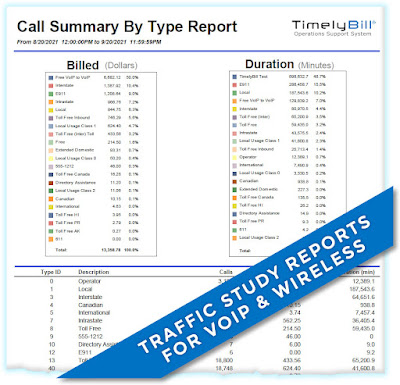
Communications service providers that rely on safe harbor may face a disadvantage over competitors who use traffic studies. To help CSPs compete, TimelyBill can generate these usage reports on the fly.
Here is an overview of how USF, safe harbor, and traffic studies impact today's CSPs.
Universal Service Fund & Fees
Developed by the FCC, the USF program supports universal services for schools, libraries, and rural healthcare facilities. The USF program is funded by contributions made by CSPs who pass these fees on to their customers. Such costs appear on telephone and wireless bills as "universal service" charges. Telcos are required to pay into the USF a percentage of their interstate and international revenues.
Safe Harbor Rates
The FCC states that CSPs not wishing to measure their "actual" usage could assume a percentage of their overall calls were interstate/international (currently 64.9% for VoIP ↗️, 37.1% for Wireless). Service providers that cannot determine actual interstate revenue via call detail records or traffic studies can use the appropriate FCC-approved safe harbor percentage.
Traffic Studies
In-depth traffic analysis can help CSPs gain an understanding of the distribution of voice calls. A traffic study can identify the actual Percent of Interstate Usage (PIU) rather than using the FCC's safe harbor rate.
It can be best for a service provider to study how much they can save by calculating their actual PIU (rather than using the generic safe harbor ratio). In some cases, a provider's PIU is half of the FCC safe harbor percentage.
TimelyBill's Report Engine
Using our reporting engine, TimelyBill customers can perform a traffic study using our built-in report, "Call Summary By Type." This report is available on demand and allows you to define a variable date range.
TimelyBill can analyze your call data to determine what the actual percent of interstate usage is.
TimelyBill's Tax Calculator
Using data from the leading telecom tax providers, TimelyBill calculates taxes and fees on communications services and automatically applies them to invoices and billing-related transactions. Based on your traffic studies, TimelyBill enables CSPs to set tax code overrides (globally or for individual customers) to best meet your needs.
Are You Losing Money to USF Safe Harbor Rates?
The FCC safe harbor ratios can simplify tax calculation and remittance. However, they may not always work to your benefit. Service Providers using traffic studies may pay less money into the USF and, therefore, need to recover fewer dollars from customers.
TimelyBill has the built-in tools to help service providers determine their own taxation strategy.
Related article: "Billing Reports for Telecom"
